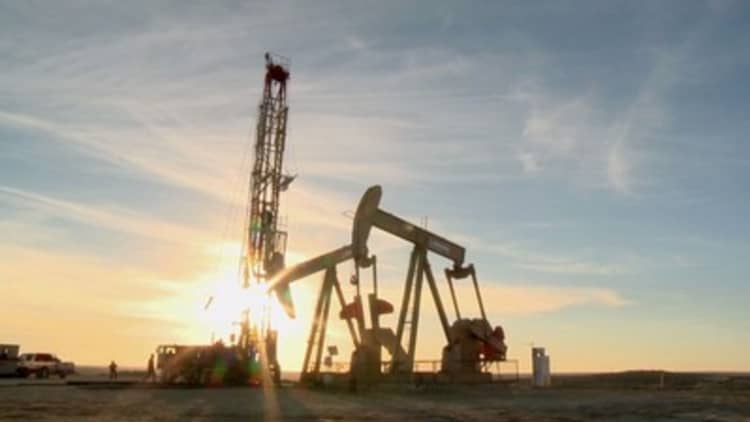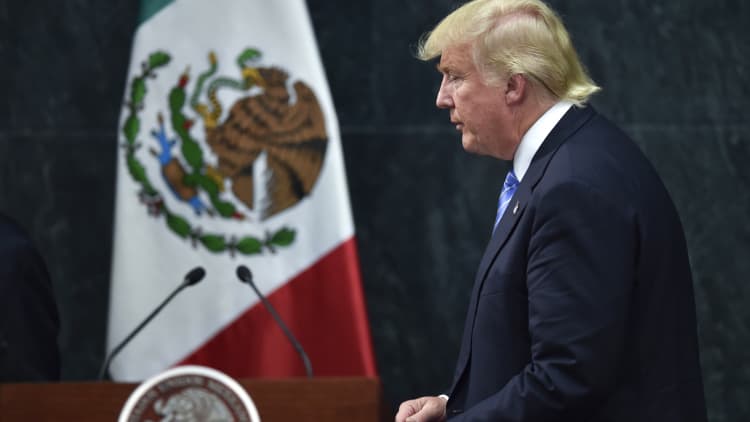
Four U.S. states on the Gulf of Mexico stand to lose billions in future payments if a proposal in the president's new budget survives congressional scrutiny.
The White House on Tuesday proposed ending a program that shares revenue from offshore oil and gas drilling with the states — and it does so just as those payments were scheduled to expand significantly.
Alabama, Louisiana, Mississippi and Texas — all of which went for Donald Trump in the 2016 presidential election — are trying to close their own budget gaps amid a protracted oil price downturn and as the new White House budget asks them to absorb cuts to social welfare programs.
The GOMESA program is critical to coastal states, who assume the environmental and economic risks and provide a majority of the infrastructure and workforce for the offshore oil and gas industryRep. Bradley ByrneR-Ala.
The plan is part of the president's effort to contain the growth of the U.S. federal deficit. The Office of Management and Budget estimates that ending the royalty-sharing program would save the federal government $3.6 billion over a decade.
The program is part of the 2006 Gulf of Mexico Energy Security Act, or GOMESA, which was designed to encourage offshore drilling by giving states a cut when Washington leases federal water to energy companies for exploration.
The act paid out a modest $36.5 million between 2009 and 2016. But those payments were projected to spike higher beginning this year: They were to jump to $272 million total in fiscal 2018
The payments were to reach the program cap of $375 million per year by 2022, according to estimates in the president's budget. Texas and
The Department of Interior said the administration proposed ending the program "to ensure the sale of public resources from Federal waters owned by all Americans, benefit all Americans."
But others argue that states whose seascapes are dotted with oil rigs deserve a bigger piece of the pie.
"The GOMESA program is critical to coastal states, who assume the environmental and economic risks and provide a majority of the infrastructure and workforce for the offshore oil and gas industry," said Republican congressman Bradley Byrne, who represents a coastal district of Alabama.

Alabama and other states on the Gulf know those risks well. The 2010 BP Deepwater Horizon oil spill contaminated 1,100 miles of coastline and cost the region's fishing and tourism industries hundreds of millions of dollars in lost revenue.
On Monday, House Majority Whip Steve Scalise, R.-La., alluded to revenue sharing in a statement on the budget.
"I will also be working to ensure that any budget we pass in the House addresses the priorities important to Louisiana, including fiscal responsibility, increased energy production and the revenue sharing that goes along with it," he said.
Feds to states: You're already getting BP payouts
In laying out its justification for canceling the program, the Interior Department noted that the states were "set to receive additional benefits from the payout of the $20.8 billion BP oil spill settlement agreement."
In response, the Democratic governor of Louisiana on Tuesday said the Washington budget plan "robs Louisiana" of promised funds for coastal restoration.
Those funds, said John Bel Edwards, are "already appropriated in the Fiscal Year 2018 budget toward critical projects that address coastal restoration and hurricane
The Interior Department further argued that the four states receive a share of revenue from oil and gas production under another law, the Outer Continental Shelf Lands Act. Those payments have totaled $279.1 million over the seven years GOMESA has been making disbursements.
President Barack Obama proposed funneling royalties to programs that protect natural resources. The House of Representatives last year adopted an amendment from Byrne, the Alabama congressman, that blocked the move.
"We have successfully pushed back in the past against efforts by the Obama administration to alter this program, and I expect we will do the same this year," Byrne told CNBC. "This money belongs on the Gulf Coast."


